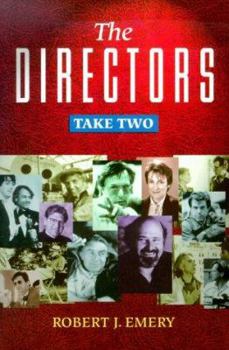Book Overview
Here are never-before-revealed details from such renowned filmmakers as Norman Jewison, James Cameron, Rob Reiner, Spike Lee, and Garry Marshall regarding their experiences making a variety of classic... This description may be from another edition of this product.
Format:Paperback
Language:English
ISBN:1575001292
ISBN13:9781575001296
Release Date:April 2000
Publisher:TV Books
Length:384 Pages
Weight:1.20 lbs.
Dimensions:1.1" x 6.0" x 9.0"
Customer Reviews
3 ratings
Another "Baker's Dozen"
Published by Thriftbooks.com User , 22 years ago
This is one of three books assembled by Emery based on material generated during the production of the television series "The Directors" on the Encore Movie Channel. The others are The Directors: Take One and Directors Take Two: In Their Own Words. Emery's role was to pose the questions to which the directors responded and then edit transcripts of the given programs televised. Literally, the directors speak for themselves. That is to say, Emery (wisely, I think) eschews the standard Q & A format. Some readers will be especially interested in specific directors; others will be more interested in specific films; still others (I among them) will be interested in both the directors and the films they directed. Predictably the quality of the material varies, sometimes significantly. For example, in this volume, I found the general observations by Gary Marshall and Rob Reiner much more informative than those by John G. Avildsen and John McTierman. (Other readers may have an entirely different opinion. Fair enough.) The overall value of the book, however, is derived from having direct access to the thoughts and feelings of these directors and I regret that such access is not readily available -- in a single volume -- to so many other great directors (e.g. D.W. Griffith, Charlie Chaplin, Ernst Lubitsch, Cecil B. DeMille, John Ford, Federico Fellini, and Ingmar Bergman) except, perhaps in full-scale biographies, critical studies, and/or in correpondence. Fortunately, however, Peter Bogdanovich has published an excellent collection of his interviews of 16 directors (e.g. Raoul Walsh, Fritz Lang, Howard Hawks, George Cukor, and Alfred Hitchcock). Also, Richard Schickel has published another collection of his interviews of great directors such as Frank Capra, Vincente Minnelli, and King Vidor as well as of Cukor, Hawks, and Walsh.One of Emery's most effective devices in both "Directors" volumes is "The Conversation," a section which introduces each director. It follows Emery's own brief but insightful introduction to "The Films of...." I am also grateful to Emery for not intruding (as editor) on the flow of information provided in each chapter. Sure, several portions of the book's narrative could have been "tightened up" but, in that event, the book would have lost much of its unique flavor and, worse yet, its vitality and spontaneity. I think both "Directors" volumes are first-rate and highly recommend them as well as the previously mentioned collections by Bogdanovich and Schickel.
A Baker's Dozen of Great Film Directors
Published by Thriftbooks.com User , 22 years ago
This is one of three books assembled by Emery based on material generated during the production of the television series "The Directors" on the Encore Movie Channel. The others are The Directors: Take Two and Directors Take Two: In Their Own Words. Emery's role was to posed the questions to which the directors responded and then edit transcripts of the given programs televised. Literally, the directors speak for themselves. That is to say, Emery (wisely, I think) eschews the standard Q & A format. Some readers will be especially interested in specific directors; others will be more interested in specific films; still others (I among them) will be interested in both the directors and their films. Predictably the quality of the various directors' responses varies, sometimes significantly. For example, in this volume, for whatever reasons, Spike Lee's and Lawrence Kasdan's comments on their individual films are far more insightful than are those of Robert Wise and Sydney Pollack. However, because Emery also poses several specific subjects to which directors are asked to respond (e.g. "Why [Wise] Decided to Produce His Own Films" and "How Does [Pollack] Choose His Projects?"), Wise and Pollack are able to share with the reader perspectives and opinions that are probably otherwise unavailable. I was especially pleased to learn that Richard Donner considers Inside Moves (1908) "one of my greatest, dearest films." Featuring John Savage, David Morse, Diana Scarwid, and Amy Wright among an ensemble cast, this film is one I include on my own list of the very best which few people have seen or even know of. One of Emery's most effective devices is "The Conversation," a section which introduces each director in his own words. I am grateful to Emery for not intruding (as editor) on the flow of information provided in each chapter. Sure, several portions of the book's narrative could have been "tightened up" but, in that event, I think the book would have lost much of its flavor and, worse yet, its vitality and spontaneity.
Fascinating "behind the scenes" reading.
Published by Thriftbooks.com User , 24 years ago
The early roots and rise of almost thirty of today's modern film directors is charted in this history, Part 1 of a projected two-part set. This gathers the words of the directors themselves, examining how they got their start in the business and how they made some of the best films of modern times. Any involved in film history will find The Directors Take One absorbing.






